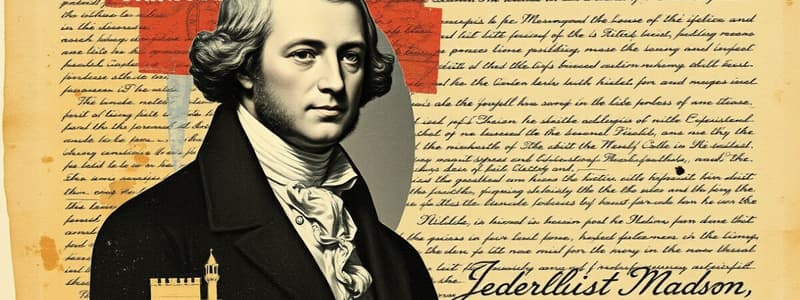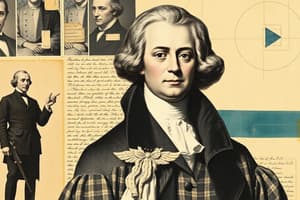Podcast
Questions and Answers
What is the main idea of Federalist 10?
What is the main idea of Federalist 10?
- Separation of powers
- Judicial review
- Checks and balances
- Factions (correct)
What is the main idea of Federalist 39?
What is the main idea of Federalist 39?
States should have separate and distinct powers.
What does Federalist 51 mainly discuss?
What does Federalist 51 mainly discuss?
Separating power between branches.
What is the main idea of Federalist 70?
What is the main idea of Federalist 70?
What is the main idea of Federalist 78?
What is the main idea of Federalist 78?
What is the main idea of Federalist 84?
What is the main idea of Federalist 84?
Who is considered the most important person in the making of the Constitution?
Who is considered the most important person in the making of the Constitution?
What is the main idea of John Locke's philosophy?
What is the main idea of John Locke's philosophy?
What is Rousseau's main idea?
What is Rousseau's main idea?
What is Thomas Hobbes' main idea?
What is Thomas Hobbes' main idea?
What did the Northwest Ordinance accomplish?
What did the Northwest Ordinance accomplish?
What was the purpose of the Land Ordinance?
What was the purpose of the Land Ordinance?
What was the main goal of the Constitutional Convention?
What was the main goal of the Constitutional Convention?
What was the plan going into the Constitutional Convention?
What was the plan going into the Constitutional Convention?
Match the sections of the Declaration of Independence:
Match the sections of the Declaration of Independence:
Flashcards are hidden until you start studying
Study Notes
Federalist Papers Insights
- Federalist 10: Discusses the dangers of factions and how a large republic can mitigate their effects.
- Federalist 39: Emphasizes the balance of power between state and federal governments, asserting that they should each have distinct powers.
- Federalist 51: Advocates for separating powers among branches of government to prevent any one branch from overpowering others.
- Federalist 70: Argues for a strong, energetic presidency while cautioning against concentrating too much power in one individual.
- Federalist 78: Describes the judicial branch as the weakest branch, highlighting its role in protecting rights without enforcement power.
- Federalist 84: Critiques the necessity of a Bill of Rights, arguing that the Constitution already ensures individual liberties.
Key Figures in Constitutional Development
- James Madison: A crucial architect of the Constitution, often referred to as the "Father of the Constitution" for his pivotal role in its drafting and promotion.
Philosophical Foundations
- John Locke: Introduced the idea of government based on the consent of the governed, with a right to revolt against unjust authority.
- Jean-Jacques Rousseau: Proposed the concept of the social contract, which asserts that individuals consent to form a society and be governed.
- Thomas Hobbes: Argued that a strong monarch is essential for maintaining peace and freedom in society.
Legislative Milestones
- Northwest Ordinance: Established a precedent by banning slavery in the Northwest Territory and provided a structured process for new state creation.
- Land Ordinance: Created a system of townships in the western territories, aiming to organize land sales and generate revenue.
Constitutional Convention Goals
- Aimed to strengthen national government in contrast to the feeble structure of the Articles of Confederation.
- Initially intended to revise the Articles, ultimately resulting in the formation of a completely new Constitution.
Declaration of Independence Structure
- Introduction: Establishes the purpose of the document.
- Theory/Justification: Outlines the philosophical basis for independence.
- Grievances: Lists complaints against King George III.
- Separation: Concludes with a formal declaration of independence from British rule.
Studying That Suits You
Use AI to generate personalized quizzes and flashcards to suit your learning preferences.




